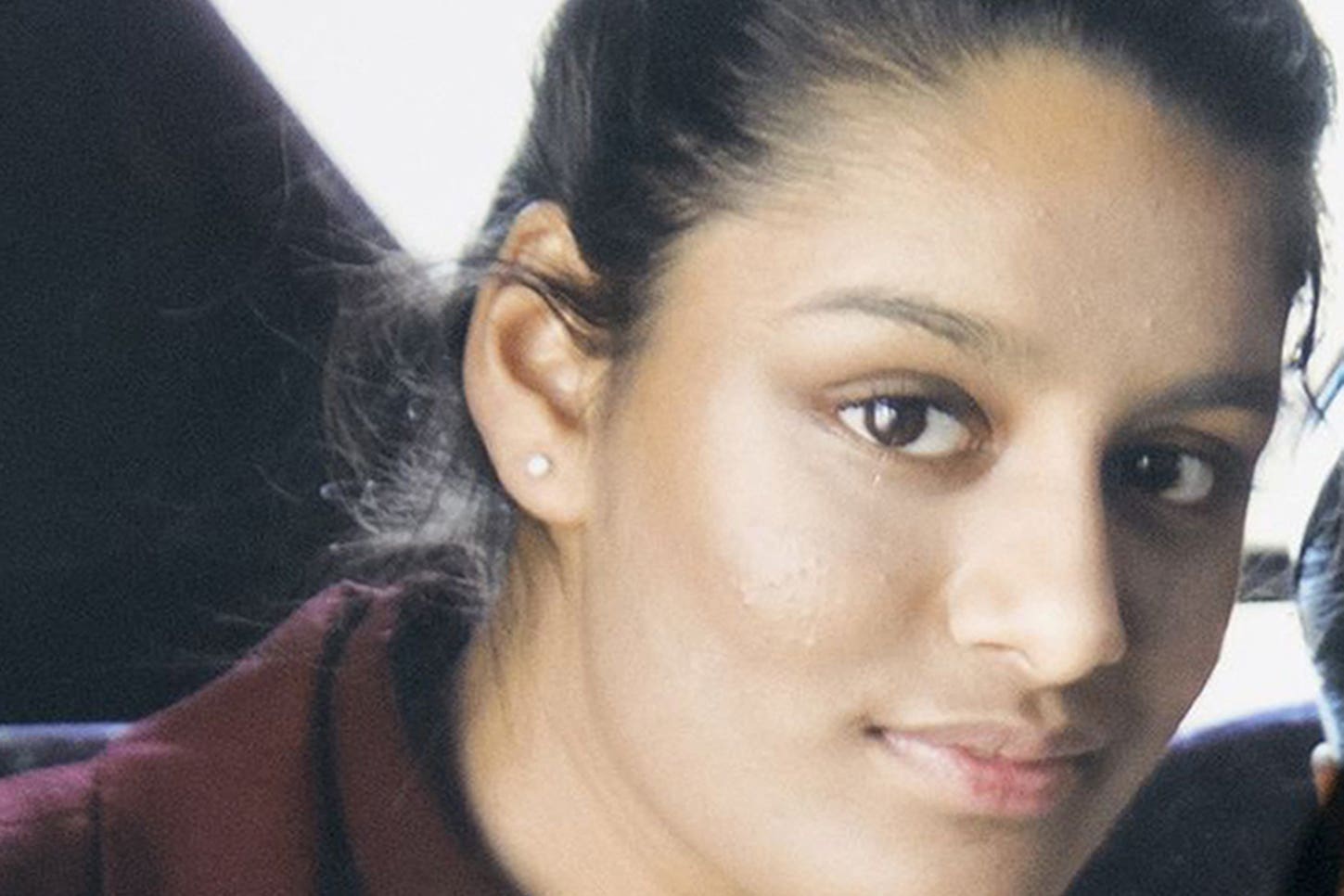Shamima Begum should be allowed to come back to UK, says terror watchdog
Ms Begum was 15 when she travelled from Bethnal Green, east London, through Turkey and into territory controlled by the so-called Islamic State.

Your support helps us to tell the story
From reproductive rights to climate change to Big Tech, The Independent is on the ground when the story is developing. Whether it's investigating the financials of Elon Musk's pro-Trump PAC or producing our latest documentary, 'The A Word', which shines a light on the American women fighting for reproductive rights, we know how important it is to parse out the facts from the messaging.
At such a critical moment in US history, we need reporters on the ground. Your donation allows us to keep sending journalists to speak to both sides of the story.
The Independent is trusted by Americans across the entire political spectrum. And unlike many other quality news outlets, we choose not to lock Americans out of our reporting and analysis with paywalls. We believe quality journalism should be available to everyone, paid for by those who can afford it.
Your support makes all the difference.Shamima Begum and other British women who joined Islamic State should be allowed to return to the UK, a terror watchdog will say.
Jonathan Hall KC, the reviewer of terrorism legislation, will argue that British women or those who are former citizens should be allowed to return from Syria because that is the position taken by allies such as the United States.
He is also set to raise concerns about a new generation of extremists being reared under the “cubs of the caliphate” programme in northern Syria during a speech at King’s College London on Monday evening.
Compared to men, women are less likely to have travelled for the purpose of fighting; are less likely to have played battlefield roles; may well have had less autonomy in being able to leave; and now make up the majority of those UK-linked individuals detained
Ms Begum was 15 when she travelled from Bethnal Green, east London, through Turkey and into territory controlled by the so-called Islamic State (IS) group in 2015, before her citizenship was revoked in February 2019.
She has been locked in a legal battle ever since and last week the 23-year-old lost her latest challenge against the decision to strip her of her British citizenship on national security grounds.
The Special Immigration Appeals Commission (SIAC) found there was a “credible suspicion that Ms Begum was recruited, transferred and then harboured for the purpose of sexual exploitation”.
However, the tribunal said this did not prevent the then-home secretary Sajid Javid from removing her citizenship.
Ms Begum – whose case has prompted huge debate – is reportedly one of an estimated 60 British women and children held by Kurdish authorities in Syria who have no means of leaving without the UK Government’s co-operation.
In comments first reported by The Times, Mr Hall is expected to say the UK’s “strategic distance” policy of removal of citizenship, limited consular assistance and funding of Kurdish detaining authorities is “at a crossroads”.
He will say that the risk posed by IS has changed and that, as repatriations by other European countries have picked up, the UK is “under the spotlight”.
Mr Hall will acknowledge the concerns about the risk IS Britons could pose but also argue that decisions need to be made and this could come “sooner than expected through US and allied pressure, Turkish military activity, court rulings, or natural disasters such as the recent earthquake”.
He will add: “Compared to men, women are less likely to have travelled for the purpose of fighting; are less likely to have played battlefield roles; may well have had less autonomy in being able to leave; and now make up the majority of those UK-linked individuals detained.
“Women with children may also fear child protection measures being taken against them by Western states, mitigating against further terrorist engagement on return.”
Mr Hall will confess to having “no answer” to those who say this could be discriminatory or “belittles female agency” or fails to recognise the role of female terrorists.
But he will add that statistics have shown men were predominantly involved in terrorism plots.
“For UK-linked children, the less time spent being incubated as cubs of the caliphate, an active IS programme, the better,” he will add.
Former Home Secretary Priti Patel argued Begum should not be brought back to the UK.
When asked about the case at a Policy Exchange event in Westminster on Monday afternoon, she said: “It is very difficult and we are an outlier, but we are an outlier for good reason, and those reasons include the threat to our own citizens and the threat to our country.”
Having seen the “security and intelligence behind some of these decisions”, she added: “As much as it may be uncomfortable for some, as long as someone is a threat and an individual is a threat to our country, and a threat to our citizens, I think it’s right that they are not brought back here.
“I just believe that we have to do everything we can to protect our country.”
She also said the “implications” of bringing someone like Begum back to the UK and the resources required if that were to happen would be “absolutely phenomenal”.